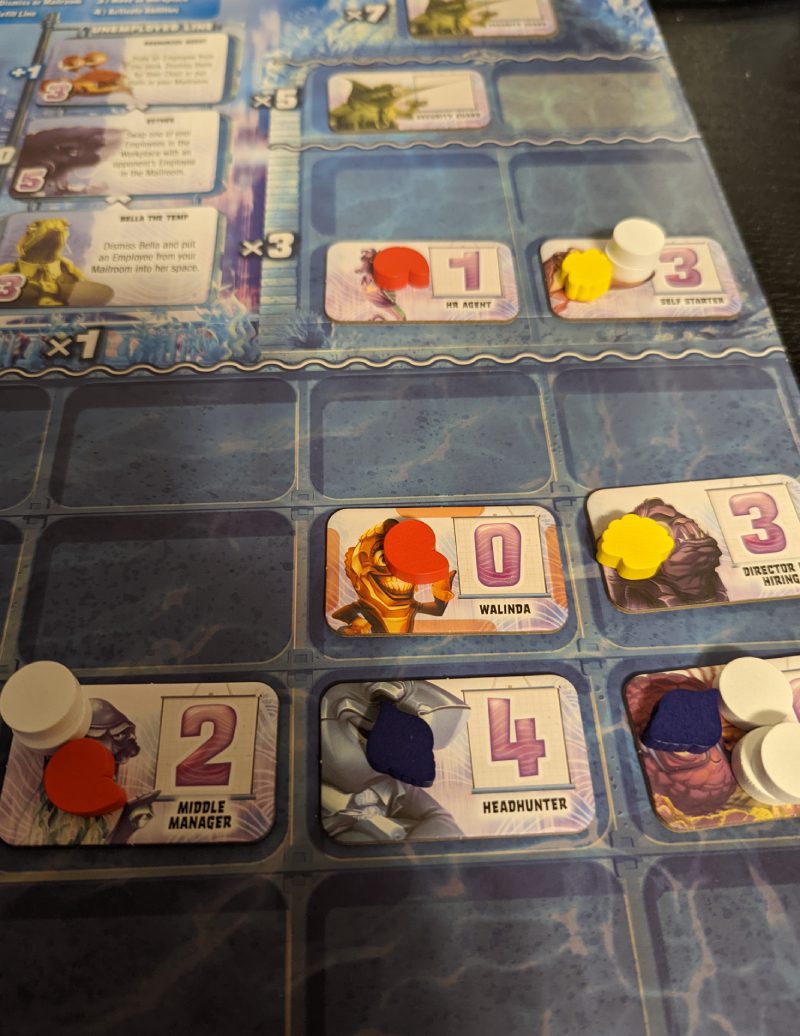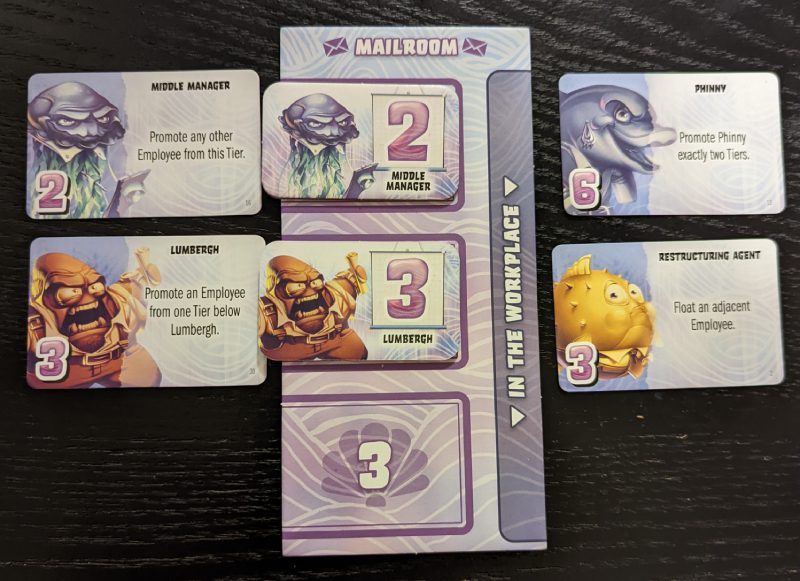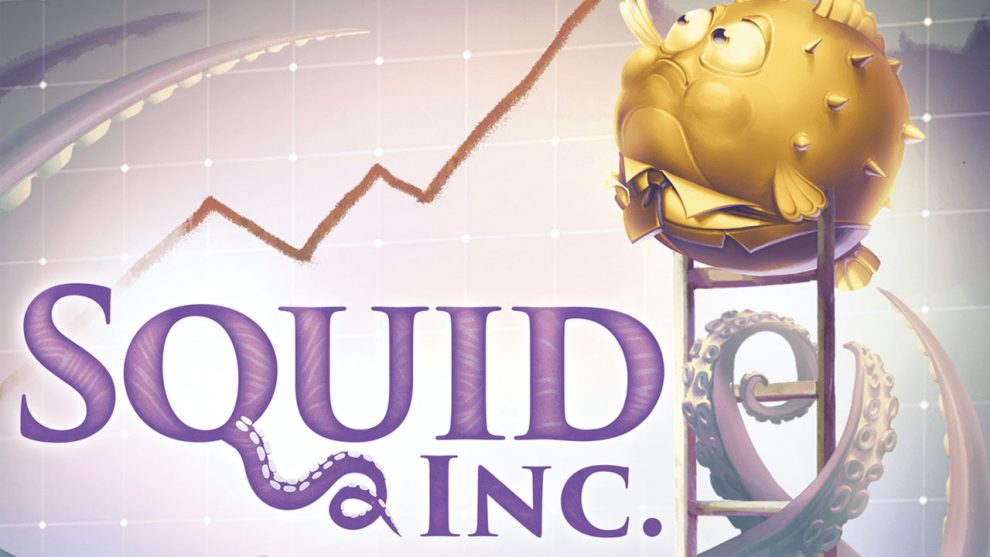Disclosure: Meeple Mountain received a free copy of this product in exchange for an honest, unbiased review. This review is not intended to be an endorsement.
One of the perceived perks of being a board game critic is getting review copies. Most of the time, you will realize that most games are not that great, taking your precious time away from games you enjoy. However, there are rare occasions where you get a review copy, a week passes by, and you’ve played it six times already. Let me tell you about Squid Inc.
You and your opponents are guppies in this underwater corporation. What does this corporation do? Who cares because you are only interested in Clout. You will pull some fish from the unemployment line, shove them into your mailroom, and eventually get them in the workplace. After that, you will use your carefully crafted network to rise to the top. Like real-life corporations, the journey to the top is a reverse funnel, and there isn’t enough room for everyone’s ambitions.
Tell me something about yourself
The first thing you’ll do on your turn is take a quick glance at the three cards in the Unemployment line and either dismiss one or add one to your Mailroom. You can only have three employees in your Mailroom at a time.
Dismissing them is an entirely different story. Every fish has a Clout value from 0 to 6, and you dismiss them from the unemployment line to get Clout tokens. You immediately assign these tokens to either an employee in the Workplace or Mailroom. There is an option to split between the two, but it can only be one employee in the Workplace and one in the Mailroom.
Clout tokens are the gas that fuels the engine of this game. To send an employee from the Mailroom, it needs to have Clout tokens to spend equal to its value. Employees who wish to activate their abilities in the Workplace must spend Clout tokens equivalent to their Clout value.
This is perhaps one of the most innovative systems I have come across for quite some time. Clout represents your points, so obviously you want to attract the biggest fish to the Workplace and move them up to the higher tiers. The challenge here is employees with higher Clout require more resources to move them around. You need to spend more of your turns dismissing employees to either deploy your own from the mailroom to the workplace, or you need the Clout to activate their abilities.

What are your greatest strengths?
I might as well take advantage of this segue and talk about the abilities. If you were expecting a game where everyone is isolated doing their own thing to score points, you won’t find that here. The vast majority of the abilities will screw over other players and selfishly help you, such as taking control of adjacent employees, demoting, or outright throwing them back to the mailroom. You are essentially creating your clique in a toxic workplace environment. It feels like forming your adventuring party in a roleplaying game, except you are not using warriors, rogues, and wizards. Instead, you use middle managers, HR agents, and headhunters to help you out.
Abilities play a significant role here since you need specific characters to Promote your employees to higher tiers. The Workplace is divided into four tiers, with each tier representing a multiplier. When you dispatch your employee from the Mailroom to the Workplace, they start at the lowest tier which is a multiplier of 1. So that Restructuring Agent worth 3 Clout isn’t doing much at the bottom, but put that yellow pufferfish in the third tier that is a multiplier of 5? That’s 15 points, and he’s a threat now. If that sounds completely unfair and unbalanced, that’s because it is. The game’s subtext about corporate life is as subtle as a molotov cocktail thrown through a broken window.
Floating is another weapon in your arsenal. It’s a special type of ability that physically pushes pieces off the board like a sliding puzzle. Anyone pushed away from the board leads to a Demotion or worse, a Dismissal.
Demotions are exactly what you think it is, forcing an employee to move down a tier. Dismissals, which are triggered by specific abilities or a Demotion gone really wrong, remove them from the Workplace. When a Dismissal occurs in the Workplace, a security guard shows up to fill a slot. They have no clout, so they can be displaced by anyone moving into their space, and are there to trigger the end game. The end game is triggered when the entire workplace is filled, and all of the cards have been used.
Simply count up your employees based on their multiplier, add in the clout tokens left on the employees in the workplace, and that’s your score.

What’s your work style?
I will probably annoy a few old-timers when I say this, but I can’t stop thinking of Reiner Knizia when I play this game.
For those who don’t know, Reiner Knizia is a game designer that has been in the business since 1990. Many of his games tend to have a straightforward groundwork of rules to understand but tend to be larger in scope once you sink your teeth into the experience.
Some of his games also have an implied narrative or message behind them. One easy example is Modern Art. Modern Art is a 1992 auction card game where players bid on art pieces because they perceive them to have value at the end of the round. It’s a simple game that criticized the modern art industry, which sadly still applies today.
Squid Inc follows in the same footsteps as Reiner Knizia’s work. It takes about ten minutes to explain the rules with an implied narrative if you are willing to squint hard enough. It’s a game about cliques forming and collaborating in a hostile work environment with every employee representing a toxic stereotype. Your job is to form a crack team of them that will help each other swim through this gauntlet of bureaucracy and power.
What can you bring to the company?
Take a good look at Walinda. She has a 0 Clout value. When placing her in the workplace, anyone adjacent to her cannot use their abilities. She doesn’t do anything productive. All she does is chat, and you’ll learn to hate her. That expensive Poacher that you threw in the last turn? He can’t do anything now because of her.
But the Middle Manager that you put on your first turn is still around. He can Promote anyone within his Tier, so maybe get the Poacher out of that situation with Walinda. Or perhaps promote Walinda to annoy the employees at the top of this power pyramid while freeing your employees from her nonsense. She is worth 0 Clout, and 0 multiplied by whatever is still 0. Failing upwards is a viable tactic here.
When I said this game wasn’t subtle, I meant it.
Maybe you don’t care about the stories or themes of board games. You’re only interested in being mentally invested in the experience by making meaningful decisions. Wipe off the narrative paintwork and Squid Inc still performs exceptionally well.
However, this is a tactical experience, not a strategic one. At the start of every turn, you only have three cards to look at the unemployment line and have no idea what the next card is. Your examination of the three cards will sometimes be measured in seconds. On some turns, you are desperate for a body so you’ll take anybody, while in other turns, you merely look at the highest Clout and get rid of them for tokens. Hate drafting is part of the play here and the pacing is constantly moving forward like a well-funded subway system.

Why should we hire you?
I will say that the number of different abilities isn’t close to anything like Terraforming Mars Ares Expedition or Race for the Galaxy. While there are only a few dozen abilities, each one is unique and useful. Out of the six games of Squid Inc for this review, I never felt there was any dominating power due to how Clout tokens work. Powerful employees like Brian have the power to take control of adjacent employees. That sounds insanely overpowered, but it requires 6 Clout to activate, which can easily take two or three turns. If anything nasty happens to you in this game, you weren’t paying attention. While this is a mean game, it is a fair one.
If you are sweating about player scaling, don’t be. I’ve played with all player counts, and I was surprised by how well this game plays with two players. I’m not usually into two player experiences, yet I wouldn’t deny a game of this at that player count. It was surprisingly tight and engaging, with the tension between you and your opponent so thick that you can cut it with a knife.
There is only one criticism I have about this game. It is, perhaps, one of the dumbest things I ever had to complain about.
The rulebook does not mention ties.
Not even the typical “Tied players share victory” or anything generic. It simply doesn’t acknowledge it, as if it doesn’t exist. It existed in my first game with a score of 42 (great number!). Maybe the BoardGameGeek forum gods will eventually answer this one.
Outside of that, I would be annoyed if this doesn’t gain any traction. It is a game that looks and acts like a filler on the surface but goes beyond those expectations once you start diving in. Few games utilize interaction in such a polished manner as this. I feel like I will be hard-pressed to not compare future games with high player engagement to Squid Inc. It’s just that good.
Now if only Walinda would jump into a lake of fire.












Add Comment